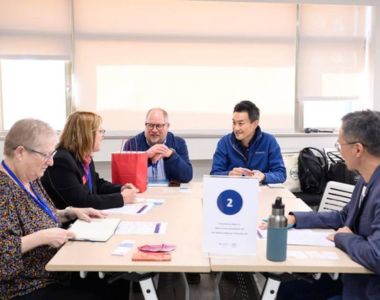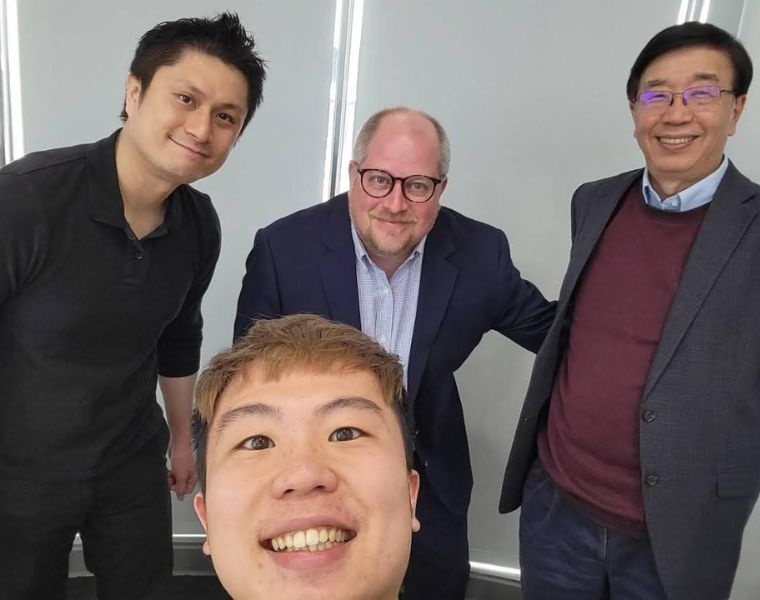Each year, thousands of people participate in the U.S. Department of State’s Fulbright programs, prestigious appointments through which students, scholars, educators and other professionals come together to engage in a global exchange of knowledge. A variety of Fulbright programs are offered, each with their own aims and time requirements. In recognition of International Education Week, celebrated Nov. 13–17, The Daily will share the stories of some of Case Western Reserve University’s most recent Fulbright recipients each day this week.
When Christopher Sippel packed for his Fulbright International Education Administrators (IEA) trip to Taiwan earlier this year, he made sure to bring 400 business cards—the number program organizers encouraged him to take. He doubted there was a reason to have so many.
But after engaging with countless professionals at meetings, seminars and meetings over the course of his two-week trip, he didn’t have many to bring back to Cleveland.
As director of faculty international engagement in the Center for International Affairs at Case Western Reserve University, part of Sippel’s role is helping faculty members explore the options open to them to participate in Fulbright experiences.
This program has put him in a better position to do so, after getting to know a variety of institutions, including K-12 schools, government agencies and culturally important sites.
Read more about his experience.
Answers have been lightly edited for clarity and length.
1. What motivated you to apply for a Fulbright award, and how did you choose your specific research or teaching destination?
As an international educator, it is very important that I continue to engage and enhance my own global connections and understanding, especially in countries and regions where I have little experience. I believe it is important to challenge myself in the same way I challenge others to engage in new and profound ways with the world. I knew that the Fulbright Program would provide an important avenue for me to continue this essential learning.

I chose Taiwan because I knew very little about it. I had some basic knowledge and had been on a very short visit to Taiwan once before, but it was a whirlwind, which did not provide much time for study and reflection. I didn’t learn much about its higher educational system and the possibilities for engagement.
I was captivated, however, by the friendly people and their willingness to engage with me. Even in Taipei, a very large urban center where people can often be cold, I found people to be very warm. It seemed clear that returning to Taiwan on the IEA program to learn more about it would be beneficial on many levels.
2. How does receiving a Fulbright award align with your research or teaching goals, and what impact do you anticipate it having on your academic career?
Receiving the IEA award to Taiwan aligns with my professional value of continuing to challenge myself as I explore cultures and learn about educational opportunities in places in which I have had limited interaction. Having spent time in over 45 countries, I still learn a lot about myself and others with each new experience.
During my award period in Taiwan, I had many meaningful interactions that have resulted in lots of new or refreshed mutually beneficial opportunities for engagement. One such interaction during my time in Taiwan has already led to a delegation from one institution visiting CWRU in early October to discuss plans for a joint research program.
3. Were there any challenges in adapting to a new academic and cultural environment, and how did you address them?
As my program was only two weeks and its focus was all about learning about a new educational system and culture, any challenges that I experienced were welcome opportunities for learning. The support provided by Fulbright Taiwan aided me greatly in adapting to my new environment.
4. What advice do you have for other faculty members who are considering applying for Fulbright awards in the future?
I would encourage anyone interested in Fulbright to consider the fact that there is a vast array of programs that fall under Fulbright’s umbrella. Many individuals that I speak with about Fulbright only know about the traditional award that is a semester or year abroad. This is not the only option.
There are programs as short as two-weeks that can correspond to an individual’s schedule, allowing travel in the summer when perhaps a scholar has more availability. Some programs, such as the Fulbright Specialist, have a more flexible application calendar with deadlines occurring every two months.
I would also note that the Fulbright Scholar Program isn’t just an outbound program, but that there also is a robust inbound program. Perhaps you are not able to participate in an outbound program, but why not host an international scholar in your department or school through the Outreach Lecturing Fund (OLF) or the Scholars-in-Residence programs? The Fulbright program provides opportunities for everyone.
Lastly, I would encourage any faculty interested in Fulbright to reach out to me (cms417@case.edu). I serve as the Fulbright faculty liaison at CWRU and can support you in exploring the various opportunities, connect you to other Fulbright alumni on campus, help you find an international host and assist you with the application process.

